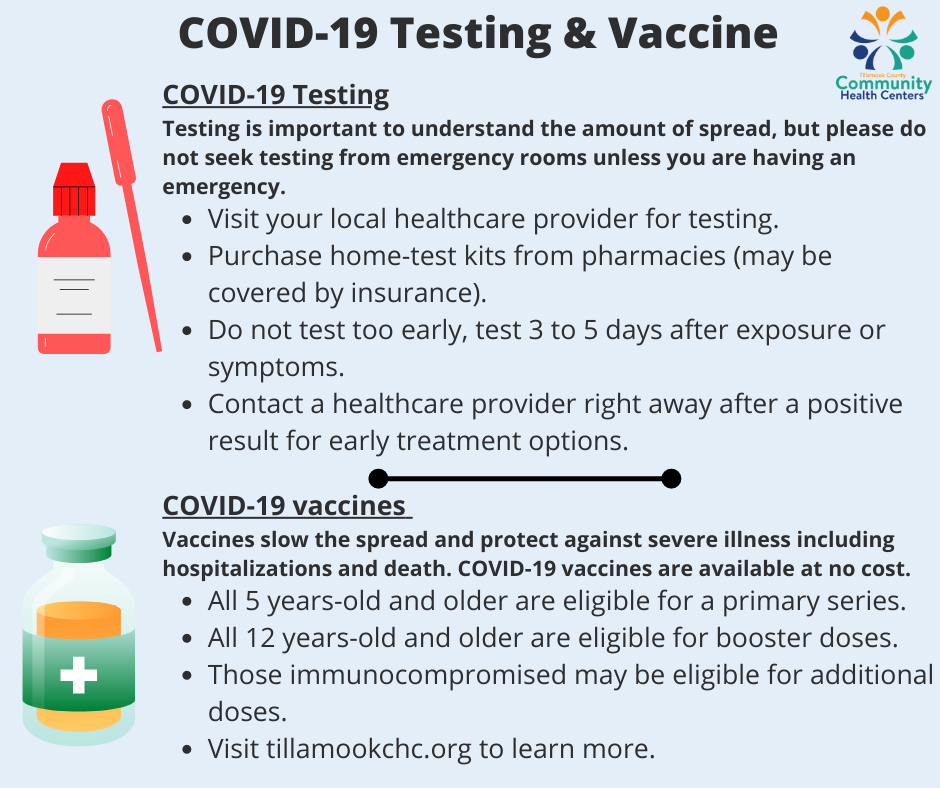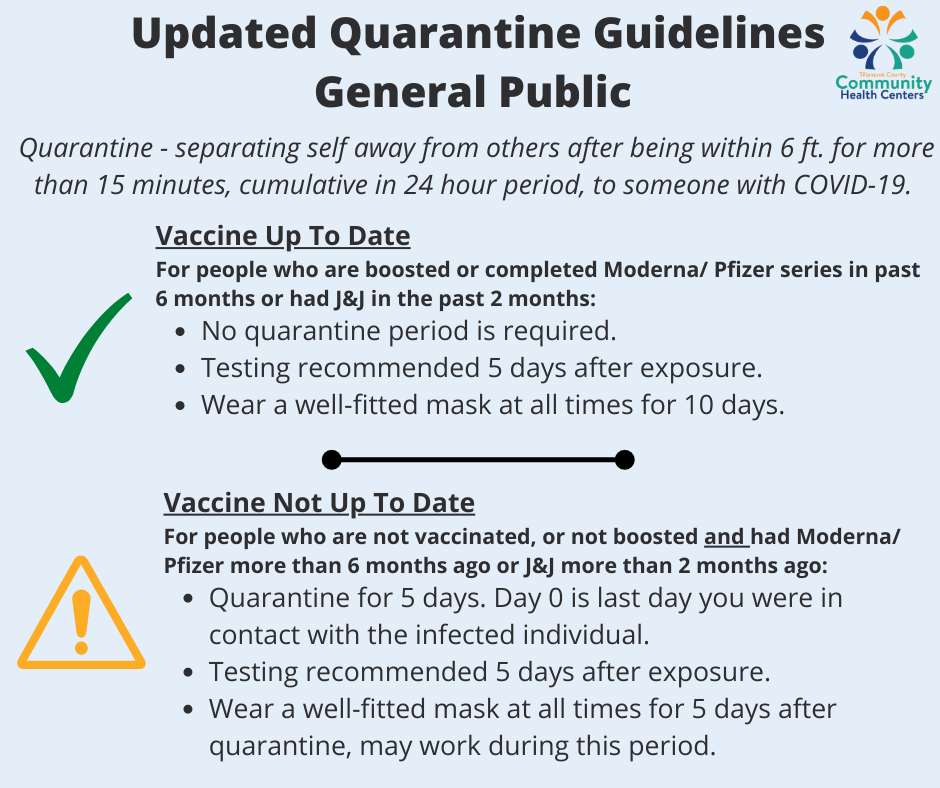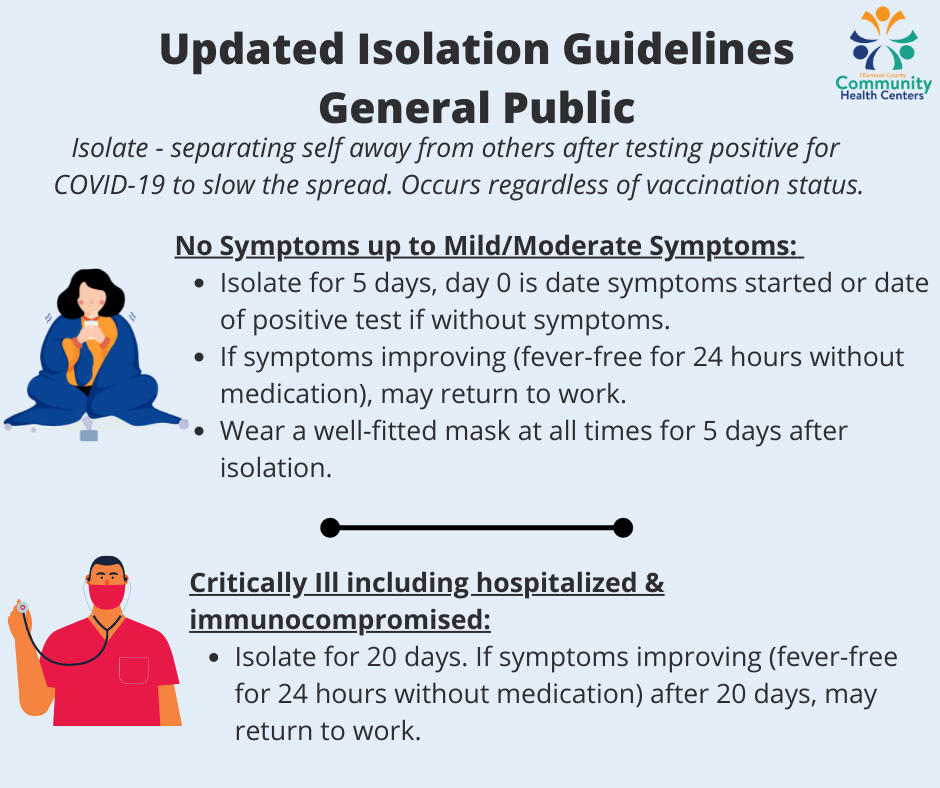First Cases of Omicron Variant Found in Tillamook County and Surge Updates

January 10, 2022 / 10 de enero 2022
COVID-19 Response / Respuesta COVID-19
Tillamook, Ore — Two cases of the COVID-19 variant, Omicron, have been detected in Tillamook County. Following Oregon Health Authority guidelines for variant sequencing, Tillamook County Public Health requested variant sequencing by the state lab for samples collected on 12/26/2021. Due to the limited capacity of the state lab, not all positive COVID-19 tests may be sequenced and return of results may be delayed such as in the case of these two samples.
Tillamook County is experiencing an increase in COVID-19 cases, with positive COVID-19 cases increasing from 91 in the previous 7-day case count to 129 in the current 7-day case count. This surge is likely due to recent holiday gatherings and the arrival of the highly contagious Omicron variant.
The best protection against severe disease and death from COVID-19 is to be up to date on your vaccinations. A chart describing what “up to date” means is at the end of this news release.
Slowing the spread of COVID-19 is a layered approach, so every action can help reduce your risk of illness, here are some actions to take:
- Choose to get vaccinated against COVID-19 as soon as you are able to for everyone 5-years-old and older, and if already fully vaccinated, choose to receive a booster dose.
- Wear a well-fitting mask in public when you are around people. Consider upgrading the level of your mask protection.
- Stay at least 6 feet from those who do not live with you. Increase cleaning in your environment and washing your hands.
- Refrain from touching your mouth, nose, and eyes.
- Avoid large gatherings, if you choose to gather, improve ventilation, for example open windows or gather outside.
- If you have symptoms of COVID-19 such as shortness of breath, cough, fever, loss of taste or smell, fatigue, muscle or body aches, headache, sore throat, runny nose, nausea or vomiting, or diarrhea, seek COVID-19 testing.
In preparation, as we enter the Omicron surge, public health guidelines have been adapted to support public health staff in their COVID-19 response.
Local public health staff will only be able to contact a limited number of positive COVID-19 cases to perform case investigation. With more COVID-19 cases than public health staff can manage, it is important that the community take action to keep themselves and others safe after a positive test or exposure.
Public health staff is committed to making the education for cases and contacts available as well as supporting the community by having staff available to answer questions. Please call 503-842-3940 to reach public health staff.
Information regarding COVID-19 testing, vaccination, positive case guidance and close contacts/ exposure guidance is provided next in this news release.
COVID-19 Testing:
A viral test for COVID-19 tells you if you have a current infection. During a viral test, the inside of the nose is swabbed, and the swab is then used to detect the presence of COVID-19 using a quick-antigen test or sending the swab to a lab to be processed (PCR-test).
- Quick- Antigen test: Available via home/self-kits or from healthcare facilities. Follow the manufacture instructions included with the kit if performing at home. Results are typically available within 15 minutes. This test can only detect a higher presence of the virus in your body and is often recommended to use when symptomatic or 3-5 days after a potential exposure.
- PCR test: Available via home/self-kits or from healthcare facilities. Follow the manufacture instructions included with the kit if performing at home. These tests require the sample to be sent to a lab facility for processing. Results are typically available within 2-3 days. This test can detect lower levels of the virus in the body due to the more advanced equipment used in the lab facility. Recommended for use for asymptomatic close contacts and for those with symptoms after a negative quick-antigen test.
Tillamook County public health expects to receive a small supply of quick-antigen home-tests from Oregon Health Authority (OHA) in the following weeks. These kits will be supplied to the community based on OHA’s ongoing commitment to centering equity in our COVID-19 response efforts as well as the priorities of maintaining health care system infrastructure and keeping students in school. Home-test kits may be a covered benefit, please contact your health insurance. For a list of FDA approved quick-antigen tests available, here.
COVID-19 quick antigen and PCR tests are available from the following healthcare providers in Tillamook County:
- Adventist Health, Tillamook (503-842-5546)
- Tillamook County Community Health Center (503-842-3900)
- Rinehart Clinic (1-800-368-5182)
COVID-19 Vaccination:
Data on COVID-19 shows that booster doses of the Moderna or Pfizer vaccines provide a notable increase in antibodies to help prevent infection and reduce the risk of serious illness from the COVID-19 virus. Tillamook County has achieved a vaccination rate of 75% for its 18-and-older population that are considered fully vaccinated but only an estimated 25% of that same population has received a booster dose. Booster dose recommendation varies by vaccine:
- Pfizer: 12-years-old and older who received a second dose of Pfizer 5 months ago. Those 5-years-old and older who have moderate to severely compromised immune systems may receive a 3rd dose of Pfizer 28 days after the second dose.
- Moderna: 18-years-old and older who received a second dose of Moderna 5 months ago. Those 18-years-old and older who have moderate to severely compromised immune systems may receive the 3rd dose of Moderna 28 days after the second dose.
- Johnson & Johnson: 18-years-old and older who received a single dose of Johnson & Johnson 2 months ago. dose of Pfizer 6 months ago.
COVID-19 vaccines are available from the following healthcare providers in Tillamook County:
- Adventist Health, Tillamook (503-815-2100)
- Tillamook County Community Health Center (503-842-3900)
- Rinehart Clinic (1-800-368-5182 Ext. 100)
- Local and state pharmacies (211)
Community Guidance for Positive Tests and Close Contacts (exposures)
What to do if you test positive for COVID-19 (general public):
Whether you test positive at home with home/self-test kit, or in a healthcare setting, after a positive COVID-19 result, it can feel overwhelming. Here are some first steps to take:
- Start your isolation. Isolation keeps someone who is infected away from others, even in your own home, anyone infected should separate from others by staying in a specific “sick room” or area and use a separate bathroom (if available). Isolation is required for all regardless of vaccination status.
- Notify your close contacts and your employer. You can help slow the spread by telling those you’ve been in close contact with right away. A close contact is someone you have been within 6 feet of for a cumulative total of 15 minutes or more over a 24-hour period.
- Call, email, or text close contacts as soon as possible. Timing matters! Contact the people you were in close contact with beginning 2 days before your symptoms began. If you did not or do not have symptoms, contact the people you were in close contact with beginning 2 days before you took your COVID-19 test. Close contacts should stay home depending on their vaccine status. See the exposure guide for details.
- Do not go to work after a positive test, even if you do not have symptoms. It is strongly recommended that you tell your employer you tested positive for COVID-19. If you work in food service, you are required by law to notify your supervisor. Your employer is required to notify other employees but must keep your information confidential. If you experience discrimination when you tell your employer you tested positive for COVID-19, contact the Oregon Bureau of Labor and Industries (BOLI) right away to file a report and get help. Call 971-673-0761 or email help@boli.state.or.us. Contact Oregon OSHA to report hazards at your worksite.
- Monitor for symptoms and seek treatment. If you have mild to moderate symptoms of COVID-19 such as fever, cough, or shortness of breath, call your healthcare provider as soon as possible. Early treatment for COVID-19 is available and often must be started within 5 to 10 days after a positive test. If you have emergency signs or symptoms, call 911. These symptoms may include difficulty breathing, pain or pressure in the chest or belly, unable to drink or keep liquids down, new confusion or inability to wake up, or bluish lips or face.
What to do if you are exposed to someone who tested positive for COVID-19?
- Determine your quarantine period. Quarantining keeps someone who has been exposed to COVID-19 away from others to prevent the spread of the virus before they know they are sick or in case they have COVID-19 but have no symptoms. The length on the quarantine depends upon vaccination status.
- Unvaccinated or not up to date on COVID-19 vaccination: If you are not vaccinated against COVID-19 or have not received a booster dose and it has been more than 6 months since you received Moderna or Pfizer or more than 2 months since you received Johnson & Johnson you should quarantine away from others for 5 days. The date of your exposure is considered day 0. After 5 days, if you have not developed any symptoms, your quarantine may end, but should be followed by 5 days of wearing a well-fitted mask everywhere. Five-day quarantine does not apply to healthcare workers or those in K-12 school settings, see tillamookchc.org for detail or contact your employer for guidance.
- Up to date on COVID-19 vaccination: If you have received a booster dose or have completed Moderna or Pfizer series within 6 months or Johnson and Johnson within 2 months, you are not required quarantine. Wear a well-fitted mask everywhere for 10 days following an exposure.
- Get tested for COVID-19. If you have been in close contact with someone with COVID-19, you should be tested regardless of your vaccination status. Close contact means being within 6 feet of someone for 15 minutes or more over the course of a day, with or without a mask or face shield.
- Wait 3 to 5 days after the last time you were together with someone who tested positive for COVID-19 or when you were last exposed. If you test too early, the virus levels may be too low to detect, which makes the test less accurate. It is recommended for all to stay home and away from others while you wait to be tested.
Staying home until you can no longer spread the virus is important but staying home may not be easy. If you need assistance with food, grocery or medication delivery, call: 503-374-0750.
For a downloadable version of this information, please click here
| Vaccination Status | Definition |
| UP TO DATE | Boosted or Completed the primary series of Pfizer or Moderna within the last 6 months or Completed the primary series of J&J within the last 2 months |
| NOT UP TO DATE | Unvaccinated or Has not completed the primary series of any COVID-19 vaccine or Completed the primary series of Pfizer or Moderna over 6 months ago and is not boosted or Completed the primary series of J&J over 2 months ago and is not boosted |
About Tillamook County Community Health Centers
TCCHC has been a Federally Qualified Health Center since 1994, providing medical, dental, behavioral, and public health services. Please visit our website at https://tillamookchc.org/ or on Facebook at TillamookCHC.
__________________________
Traducción al español disponible en breve



